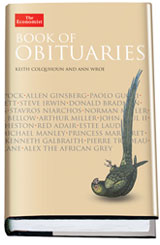Books |
The Economist Book of Obituaries
Keith Colquhoun and Ann Wroe
By
Published: Apr 22, 2009
Category:
Non Fiction
No fun is more welcome than unlikely fun.
I never thought “The Economist” and “obituaries” would find themselves in the same sentence. But English newspapers are uncommonly imaginative. (Decades ago, The Times asked me to write the obit for disco king and hotel owner Steve Rubell, and the editors seemed delighted when I ended the piece with a description of a can of Pepsi on top of the coffin.) And so, after 150 years without an obituary page, the editors of The Economist decided to lunch one.
The Economist Book of Obituaries is a collection of 200 obituaries that the paper published between 1995 and 2008. The length is fixed — about 1,000 words. There is no template for the subjects.
Oh, there are the obligatory world leaders and corporate kings. And a British book of obits that did not include Princess Diana would raise the eyebrows of the dead. No matter. The telling detail and the previously unseen anecdote make this a seriously delightful book.
Did you know — this is from an obit of Digby Baltzell, the scholar who coined the word WASP — that Al Capone’s son went to Yale and married a “well-connected” woman?
Did you know that Dr. Christian Barnard, who performed the first transplant of a human heart, believed that sex-with-romance was “the most beautiful, healthiest and most pleasurable way” to keep fit?
Did you know that Freddy Heineken wanted to put his beer in square bottles so the empties could be used as bricks in Third World countries?
And so many more. A musical psychic. A talking bird. The world’s oldest person. (The obit begins: “For l00 years nothing much happened to Jeanne Calment.”) A French ski champion, dead at 31. The king of the gypsies. The editor of the Weekly World News, who used “Bolivia” as a deadline when a story was an especially wild fabrication. A man who learned to read at age 98. Pamela Harriman, “expert between the sheets”. The forger of the “Hitler diaries”. Mao’s mouthpiece. An English gardener.
It’s a richly rewarding book, deserving of a place of honor on a coffee table. An ideal hostess gift. Useful on the bedside table, where it invites you to read one death a night, comforted by the expectation that you’ll be back for the another the next night. And just delightful to read, because, as you’d expect from The Economist, these obits are so well written. Like this, on Marcel Marceau, the mime:
He [Bip] never spoke. Mr Marceau’s father died in 1944 in Auschwitz, and Bip’s silence was a tribute to all those who had been silenced in the camps. It was a recollection, too, of the necessary muteness of resistance fighters caught by the Nazis, or quietly leading children across the Swiss border to safety, as Mr Marceau had done. In one of his acts, "Bip Remembers", the sad-faced clown relived in mime the horrors of the war and stressed the necessity of love. In another, his hands became good and evil: evil clenched and jerky, good flowing and emollient, with good just winning.
(Thanks, James)
To buy “The Economist Book of Obituaries” from Amazon.com, click here.


